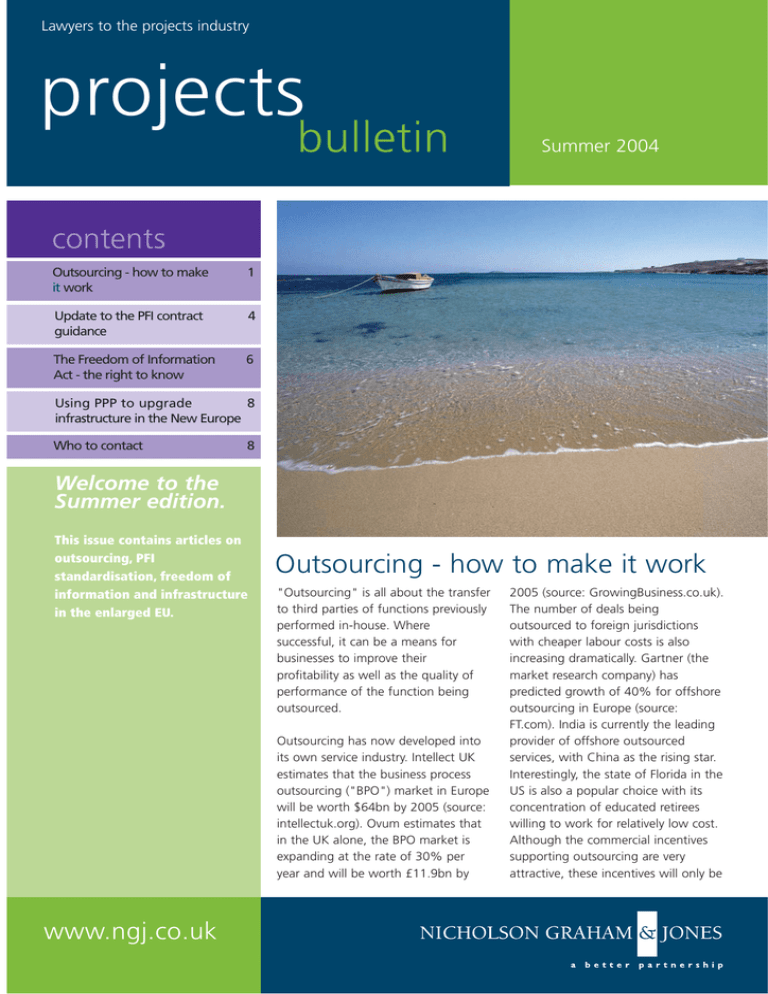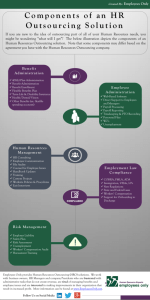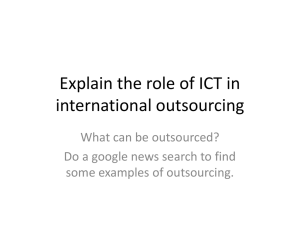projects bulletin contents
advertisement

Lawyers to the projects industry projects bulletin Summer 2004 contents Outsourcing - how to make it work 1 Update to the PFI contract guidance 4 The Freedom of Information Act - the right to know 6 Using PPP to upgrade 8 infrastructure in the New Europe Who to contact 8 Welcome to the Summer edition. This issue contains articles on outsourcing, PFI standardisation, freedom of information and infrastructure in the enlarged EU. Outsourcing - how to make it work "Outsourcing" is all about the transfer to third parties of functions previously performed in-house. Where successful, it can be a means for businesses to improve their profitability as well as the quality of performance of the function being outsourced. Outsourcing has now developed into its own service industry. Intellect UK estimates that the business process outsourcing ("BPO") market in Europe will be worth $64bn by 2005 (source: intellectuk.org). Ovum estimates that in the UK alone, the BPO market is expanding at the rate of 30% per year and will be worth £11.9bn by www.ngj.co.uk 2005 (source: GrowingBusiness.co.uk). The number of deals being outsourced to foreign jurisdictions with cheaper labour costs is also increasing dramatically. Gartner (the market research company) has predicted growth of 40% for offshore outsourcing in Europe (source: FT.com). India is currently the leading provider of offshore outsourced services, with China as the rising star. Interestingly, the state of Florida in the US is also a popular choice with its concentration of educated retirees willing to work for relatively low cost. Although the commercial incentives supporting outsourcing are very attractive, these incentives will only be projects bulletin exactly what is expected of you by the customer and to formulate a competitively priced service proposal. Due diligence is also particularly important where employees of the customer will be transferring to the service provider under the Transfer of Undertakings (Protection of Employment) Regulations 1981 ("TUPE"), to determine the terms and conditions of employment that will attach to these transfers. realised if the outsourcing is carefully planned, managed and executed. As anyone who has been involved in an outsourcing will know (whether as a customer or service provider), they are generally very time-consuming and complex arrangements to structure and carry out. Set out below are some useful practical tips that will assist you to deliver a successful outsourcing deal and avoid some of the pitfalls, whether you are a customer or service provider. J Due diligence Due diligence is the key to establishing a solid foundation for any successful outsourcing. As a customer, the decision to outsource a particular business function should follow a detailed assessment of that function and its associated cost, importance and value to the business. Due diligence also allows customers to identify the benefits they seek to gain by outsourcing and to develop a clear and detailed output-based specification that can be used as the basis for assessing the proposals of potential service providers. Due diligence should also be carried out into prospective suppliers, to ensure that they can deliver to their promises and fit in with the customer's culture. As a service provider, it is essential to know what you are getting into when agreeing to take on a particular business function for a customer. By carrying out detailed due diligence of a customer's business and the function to be outsourced, you will be in a much better position to understand 2 J Get your ducks in a row It is important to make sure that you have access to key personnel during the planning stages and for the life of the outsourcing project. Ensure that you have internal buyin to the proposed outsourcing and that key personnel are committed to devote their time and energy to the project. J Onshore, offshore or nearshore? The explosion of the internet, development of faster and cheaper telecommunication services and the increasingly global economy mean that for some business functions it is cheaper to outsource to a country other than the one in which your business operates. The jargon is relatively simple once explained: 'onshore' is use of a service provider in your own country; 'nearshore' is use of a service provider in a nearby country (eg one that shares a border); and 'offshore' is use of a service provider in a geographically distant country. India, the Ukraine, the Philippines and increasingly China are popular choices for outsourced services. The availability of cheap, skilled labour in these countries is continuing to attract an increasing number of companies outsourcing their R&D and/or core CRM (customer relationship management) functions. Careful thought needs to be given to the business and legal implications of offshore/nearshore outsourcing and to balance these against the economic benefits. For example, ensuring the security of customer records may be an area of major concern, particularly for financial institutions considering service providers in countries such as India that do not have the same high levels of protection for personal data as exist throughout the EU. Summer 2004 J Heads of Agreement Many outsourcing contracts are derived (in part) from proposals submitted by potential suppliers as part of a competitive tender process. The eventual selection of a supplier follows detailed discussions with prospective tenderers. Once this process has been completed, it may be helpful for the customer and chosen supplier to sign a non-binding Heads of Agreement setting out the core commercial terms of the deal and the key performance obligations that the supplier must adhere to. J Minimise document delay Most lawyers (and their clients!) will be familiar with the frustration that comes from a deal being delayed because sufficient attention has not been given to the schedules of a contract. In outsourcing contracts, the schedules often contain detailed lists of assets (eg hardware and software), TUPE transferring employees and their entitlements, and third party contracts to be transferred from the customer to the supplier. To ensure that contract signature is not delayed while these schedules are agreed, it is sensible to prepare them early on in the negotiation process. J management process which is then incorporated into the outsourcing contract, to allow the parties to document variations to the outsourced services and the nature of their relationship. Depending on the scope of the project and the parties' relationship, it may be necessary to have different levels of change management - for example, a process requiring higher levels of authorisation where the financial implications of a change exceed a specified threshold. J Dispute escalation Outsourcing relationships are generally long-term - most outsourcing contracts run for at least 3-5 years and, in some large public sector deals, may continue for 20 years or more. Like any union, differences of opinion or grievances are likely to arise during the term of the outsourcing relationship. It is therefore sensible to establish a framework for dealing with disputes that can be adapted to suit the nature of the dispute. For example, the majority of disputes could be dealt with initially by structured discussions at a 'steering committee' level with representatives from both parties. If the dispute is not resolved, it could then be escalated to senior management, failing which it could be referred to a formal alternative dispute resolution process (eg mediation or expert determination). Parties will generally agree that taking a dispute to court should be a step Change management Outsourcing projects are rarely, if ever, static and it is not uncommon for disputes to arise as a result of scope creep or poor management of change. It is important that the parties agree a carefully thought-out change 3 projects bulletin of last resort. However, it is important not to restrict either party's right to seek interim injunctive relief where necessary. J The after-life When an outsourcing contract comes to an end, either due to expiry of the contract term or termination, the involvement of the parties does not usually just end there. The customer will generally be keen to ensure that there is a smooth transition of the outsourced services either back to the customer or to a new service provider. Outsourcing contracts therefore usually provide for the outgoing service provider to assist in ensuring that this transition takes place smoothly, perhaps by continuing to provide the services for a transition period and/or transferring to the new service provider relevant assets, contracts and employees used in the delivery of the services. It is to both parties' advantage to ensure that an exit management plan is formulated well in advance during the term of the contract, rather than waiting until the end when the relationship will not be as strong as it was in the beginning and there is little incentive for the supplier to assist the customer in transferring the service. Update to the PFI contract guidance HM Treasury has published an update to "Standardisation of PFI Contracts" (SoPC). The latest edition of SoPC is Version 3 - since 14 May 2004 it is the version procuring authorities have needed to use. HM Treasury has reaffirmed its determination that there should be "more vigorous enforcement of the standardised PFI contract across both the public and private sectors". It states that the process of standardising PFI contracts helps spread best practice, improves PFI procurements across the public sector and significantly reduces the length and cost of the procurement process. HM Treasury encourages the development of sector specific contracts (such as in education, health or in waste management for example) where doing so spreads best practice, reduces bid costs and shortens timescales for the closing of deals, provided that such contracts are consistent with Version 3 of SoPC. In some areas there are no sector specific contracts though, such as areas where there are fewer PFI contracts being put into place. In assessing the compliance of contracts with Version 3 of SoPC, HM Treasury is advised by Partnerships UK. The key changes from Version 2 (dated September 2002) are summarised opposite: For further information contact Michael Webster tel: 020 7360 8101 email: michael.webster@ngj.co.uk or Sarah Stone tel: 020 7360 8153 email: sarah.stone@ngj.co.uk 4 Summer 2004 Replacement of subcontractors The procuring authority may consider providing some relief against project termination and accrued performance points where project services are being provided by just one or two sub-contractors and the project company needs to replace one of its sub-contractors for poor performance. NGJ comment: This change allows greater flexibility in this area because it will make it easier to appoint a replacement sub-contractor. Retendering following contractor default The Authority may not go out to retender following a project company default if there is no liquid market for similar PFI projects or if the senior lenders have stepped into the project agreement and are using their reasonable efforts to find a buyer for the contract. Permitted Borrowing The requirement for senior lenders to step into a failing project in order for any additional senior financing to be counted as Permitted Borrowing (and taken into account in various termination payments) has been removed. This has been replaced by a mechanism which provides that a capped amount of "rescue refinance" may be provided by senior lenders (and may affect compensation paid in various termination scenarios - but not on contractor default). However any distribution of profits made to shareholders at any time when such additional monies are outstanding shall serve to reduce the amount of any termination payments payable on such terminations. NGJ comment: This also introduces some flexibility - where additional borrowing is permitted it is counted in determining compensation to the contractor on non-fault based termination - this may help in procuring additional finance. Permitted Borrowing tests of uninsurability The test which a contractor must satisfy - to demonstrate that other companies facing uninsurability would cease to operate - has been amended. NGJ comment: Contractors now need to show that their reaction to a risk becoming uninsurable is prudent (taking account of a number of factors) before a process for dealing with it with the Authority (which may involve the Authority self-insuring) is initiated. This change is helpful since it removes a test which would be very hard to satisfy in practice. Overall comment The changes since Version 2 are of interest and in some cases are important. However, the substantial body of SoPC is very largely unchanged and the issuance of Version 3 appears to be partly motivated by the wish to reaffirm the principles behind SoPC - that central government, and specifically HM Treasury, should lead a co-ordinated approach to PFI documentation. However the new guidance has caused some confusion in practice about the status of existing published sector guidance which does not currently reflect SoPC Version 3. 5 projects bulletin The Freedom of Information Act the right to know Introduction information it will routinely make available, how the information can be obtained and whether there is any charge for it. The purpose of the publication scheme is to make sure that a significant amount of information is readily available to members of the public without a request being tested under the Freedom of Information Act each time; and The Freedom of Information Act 2000 is coming into force, step by step, with significant pieces of it becoming effective on 1 January 2005. Public bodies in the UK are getting ready. This article summarises the Freedom of Information Act and considers its effect on PFI contracts. The purpose of the Freedom of Information Act is to promote a culture of openness and accountability amongst public authorities by providing people with rights of access to the information they hold. These rights are meant to facilitate a better general understanding of how public authorities carry out their duties, why they make their decisions and how they spend public money. The Freedom of Information Act The Freedom of Information Act applies to all recorded information held by English, Welsh and Northern Irish "public authorities" (although access to environmental information will be dealt with according to the provisions of the Environmental Information Regulations and access to personal data will continue to be dealt with under the provisions of the Data Protection Act 1998). It does not apply in Scotland, which has its own legislation on this area. J J 6 The Freedom of Information Act creates two key obligations: each public authority must adopt and maintain a publication scheme, setting out details of J from 1 January 2005, every person will have a "right to know", by being entitled, after making a request for information to a public authority, to be informed by it in writing whether it holds the information and, subject to an appropriate fee being calculated and paid, for such information to be communicated to such person within 20 working days. Who is in charge? The Freedom of Information Act places responsibilities on public authorities in dealing with information. The Secretary of State is required to issue a code of practice to public authorities on how to deal with information requests and a further code of practice is required on the keeping of records. The Information Commissioner (who was previously called the Data Protection Commissioner) enforces and oversees the Freedom of Information Act (as well as the Data Protection Act 1998). The Freedom of Information Act provides for an appeal and enforcement mechanism whereby any person may apply to the Information Summer 2004 Commissioner for a decision as to whether the public authority dealt with a specified request correctly. Exemptions to the right to know There are two categories of exemptions; absolute and qualified. If a provision confers an absolute exemption there is no duty for a public authority to consider the public interest test. The right to know does not apply under absolute exemptions in various situations, including: J to personal data (which is governed by the Data Protection Act 1998); J to information which has been provided to the public authority in confidence and disclosure of which could lead to litigation; and J where the information can be reasonably accessed by the applicant by other means. If a provision confers a qualified exemption, the Freedom of Information Act requires the public authority to consider first whether or not the exemption applies and, secondly, if the exemption does apply, the public authority must consider the public interest test. The right to know does not apply, so long as the public interest in disclosure is outweighed by the public interest against disclosure, in various situations, including: J where the information is protected by legal professional privilege; and J where the information constitutes a trade secret. How will it affect PFI contracts? Whilst the Freedom of Information Act encourages the release of information, there are many important exemptions. Nevertheless, the change is significant because the presumption will be that information needs to be disclosed by public authorities unless a specific reason can be advanced that it be withheld. That is the opposite of the present situation, where there is no general obligation to disclose information. law, and so will not provide an exemption from disclosure under the Freedom of Information Act. Accordingly, PFI participants in current and future contract negotiations may want their confidentiality clauses tightened up so that confidentiality will be protected. Confidentiality clauses may also be extended by private sector parties stating what they believe constitutes information that would, if disclosed, be likely to prejudice their commercial interests, so as to assist any reliance on the trade secrets exemption. Sometimes the public sector may consider that it has a legitimate interest in getting on with its public functions rather than being diverted by a fear of being open to greater scrutiny and criticism. Nevertheless, Mr Richard Thomas, the Information Commissioner, has warned that the Freedom of Information Act will affect all PFI and government outsourcing contracts. The private sector, which has become considerably involved through PFI in fields which were previously the exclusive domain of the public sector, may in future seek to rely on public authorities using the exemptions based on confidentiality and trade secrecy so that their commercial positions are protected. As noted above, the exemption based on confidentiality provides that there is no right to know where information has been provided to the public authority in confidence and disclosure could result in litigation. Information provided in confidence will usually be protected by a confidentiality clause. However the confidentiality clause typically included in a PFI project agreement allows disclosure if disclosure is required by 7 projects bulletin Using PPP to upgrade infrastructure in the New Europe On 1 May 2004, ten new Member States joined the European Union, being Cyprus, the Czech Republic, Estonia, Hungary, Latvia, Lithuania, Malta, Poland, Slovakia and Slovenia. Many of these new Member States will need to make substantial investments in infrastructure following their accession to the EU. Most of the new Member States are examining various forms of public private partnership ("PPP") as one way of securing the necessary investment. The principal attraction of PPP to the governments is the provision by the private sector of capital - either through equity invested in the project company, or through debt raised by the project company from banks or on the bond markets. This additional source of funding serves to supplement whatever is available by way of direct government funding at a central government or local government level or from institutions such as the EBRD or EIB. The UK lead is being followed - PPP is well established here as a way of delivering services to the public. The usual structure is some form of design build finance and operate contract Who to contact For further information contact Christopher Causer, Carolanne Cunningham or Stuart Borrie christopher.causer@ngj.co.uk carolanne.cunningham@ngj.co.uk stuart.borrie@ngj.co.uk 8 ("DBFO"), under which either central government or local government enters into a long term contract with a private sector provider. The private sector provider raises finance and then designs, builds and operates a facility for a 25 or 30 year period. The private sector provider is paid a monthly fee by the government entity for delivering the services. In some sectors an alternative "concession" approach is followed, where the private sector partner is granted a legal entitlement to levy charges on the general public in return for building and operating the facility. Many European legal systems already have in place a code of law which permits concessions of the latter type. Nicholson Graham & Jones has ties with firms in all the new Member States and is able to give advice through these contacts on legal issues facing businesses in the enlarged EU. We have also prepared (together with our law firm partners in the new Member States) an EU accession document, which describes the ten new Member States, discusses the impact of EU accession and includes information on projects. It is available on request. For UK companies interested in promoting PPP projects, it will usually be necessary to find a local partner in the same sector as a way into the market. The local partner should be in a better position to understand which level of government has the gift of a particular project and to establish the real chances of the project receiving political backing and access to funding. Nicholson Graham & Jones 110 Cannon Street, London EC4N 6AR 020 7648 9000 Internationally a member of GlobaLex The contents of these notes have been gathered from various sources. You should take advice before acting on any material covered in this projects bulletin. © Nicholson Graham & Jones 2004





